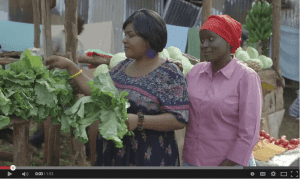
Anna sells vegetables at the farmer’s market in Makutano Junction, a small village in rural Kenya. Anna may be a cheerful woman but the truth is, life isn’t easy. She works hard everyday but given her small income, she deals with huge challenges managing her finances while taking care of three children and a husband with no job. Her children faced a real risk of malnutrition when business wasn’t doing so well: she had to sell her family’s mosquito nets just so she could buy food. She had a miscarriage due to health issues; and for a while, she could not even afford to buy the required textbooks to send her children to school.
It was a low point in her life when her girlfriends at the farmer’s market introduced her to the local bank’s Nawiri Dada campaign. Meaning “sisters achieve,” the bank wanted to get more women to open accounts to be able to safely save their money. With the support of her girlfriends from the farmer’s market and after speaking with the bank manager about the importance of saving money and how a bank can help, Anna decided to open a bank account. In just a few months she started managing her money more efficiently. A couple of months after, during a workday at the market, her friend Margaret asked her “I thought the elections were over. If you’re not counting votes, what are you doing with a pen and paper?” Anna answered, “Margaret, since I opened an account, I’ve been working so hard to save my money. So that I know, I record every vegetable that I sell and every rotten vegetable that I throw away. That way, I’ll be able to know how much money I make and plan for the future of my family.”
Anna is one of the main characters of Makutano Junction, a Kenyan soap opera with more than six million viewers. The educational TV show, set in a fictional village, portrays the lives of most low-income Kenyans in order to be relatable to the people it hopes to reach. A national Nawiri Dada campaign accompanied the show in real life, promoted by three partner banks, leveraging the publicity from the TV show to encourage account opening by women and deepening their financial literacy through marketing materials and promotional events.
This soap opera is an example of how Women’s World Banking is using different channels to develop innovative approaches to providing financial education. Women’s World Banking partnered with the producers of the popular Kenyan TV show as a means to create an awareness campaign for women to understand the benefits of using formal financial services. Apart from using mass media, Women’s World Banking has worked with other institutions to develop ways to provide financial education as part of the bank’s daily interactions with clients.

For Women’s World Banking, financial education is at the core of its mission to give more low-income women access to the financial tools and resources they require to achieve security and prosperity. Educating clients and providing them with the knowledge and confidence to fully control and grow their assets is as important as designing the relevant financial products and services to satisfy their needs. Only then can financial inclusion be fully achieved.
Contracorriente is another example of how Women’s World Banking successfully used social programming to change mindsets and women’s behavior towards financial services in other countries. In partnership with network member Banco ADOPEM (Dominican Republic), Women’s World Banking developed an 18-episode telenovela, Contracorriente (loosely translates to “undertow”), encouraging women to open and regularly use savings accounts. With the collaboration of series producer Puntos de Encuentro, Women’s World Banking promoted financial messages and supported the creation of characters to provide entertainment to viewers, while narrating several storylines on savings and money management, along with social themes such as exploitation and gender identity. Similar to Makutano Junction, Banco ADOPEM promoted a national campaign through diverse media to encourage women to save. In this case, Banco ADOPEM offered lessons on money management throughout its network of branches and training centers, and organized a two-week cast tour focusing on financial education. For both Contracorriente and Makutano Junction, part of what made them innovative was that women, after seeing the program, could go to the bank and open an account; the education was directly actionable.
With the idea to extend their outreach in Latin America, Women’s World Banking partnered with Mexican social soap opera, Mucho Corazon, to embed financial education messaging within a popular show. Like Anna, women in Chiapas face the same issues concerning lack of confidence and comprehension of financial services. Through the characters of Mucho Corazon, Women’s World Banking promoted financial literacy messages, along with useful money management strategies.
In order to further foster financial education conversation among rural women in Chiapas (an agricultural state of Mexico with the largest population of indigenous people in the region) a talk show, Hablemos de Mucho Corazon, hosted by local financial “celebrities” followed the broadcast to discuss the financial topics from that episode and to answer audience questions.
These three social programming interventions have demonstrated to Women’s World Banking that using media and audiovisual campaigns is a powerful channel in reaching to un- and underbanked populations and providing low-income women with relevant financial education messages that will help them make full use of the financial products available to them. Women’s World Banking has taken its lessons learned from these experiences to inform the financial education components of its product introduction work in other projects around the world, including youth savings in India and microinsurance in Morocco.



